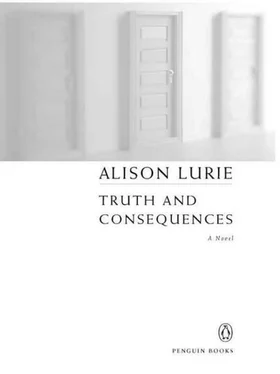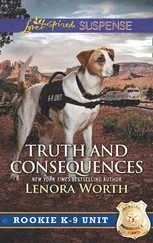Jane did not speak; all her effort was going into trying not to weep, to explode into a rush of water and wind like the one outside the cupola.
“Tell me something,” Henry said presently. “Would you feel any different if you thought you weren’t the only person who could take care of Alan? For instance, if you thought he was having an affair?”
“What?” Jane gulped down another sob, and gathered her strength to answer this absurd question. “I don’t know, probably, but he isn’t. He’s not interested in that, not now. Because of the pain, he can’t—he doesn’t—” She gave a kind of moan, realizing that she had just been deeply disloyal as well as indiscreet. “Oh, I shouldn’t have said that, I—” The sobs so long suppressed burst from her, followed by a rush of tears.
“I thought so,” Henry said ambiguously. “Please, Janey, don’t cry.” He put his arms around her again, but lightly this time, and Jane rested her face against the familiar warm, rough tan fabric of his duffle coat. “No, I take that back. Cry if you want to. But it’s going to be all right. I promise you, it’s going to be all right.”
No, it’s not, Jane thought. Nothing’s going to be all right. Not ever again.
“I can’t see you anymore,” she said, choking back a sob. “It’s got to stop.”
On Friday of the following week, Jane was in the supply room, frowning at the Copy Monster, which all day had been refusing to collate or staple. The campus technicians who repair copiers had grown tired of coming to the Unger Center, and when Jane phoned them they would not promise to be there until late next week. As a result, Jane and Susie had been collating and stapling by hand nearly all afternoon. Half an hour ago Susie had run one spike of a heavy-duty staple into her thumb and had to be sent first to the University Health Center and then home.
But the Copy Monster was the least of Jane’s troubles today. Though she had refused to see Henry, trying to do the right thing and get things clear in her head, her thoughts had remained uncollated and full of sharp spikes.
When Henry had said that everything would be all right, what he must have meant was that she would agree that they should be together. As he had pointed out, it was what she (or rather the selfish, greedy, bad part of her) wanted. If she gave in to it tomorrow afternoon they would be together, but in a dishonest, sneaky way, in some motel at least an hour from Corinth. Anywhere closer would be dangerous, because Jane, as a local, was known to people who owned or ran or worked in all the local motels. They would have to drive for at least an hour, to some cheap highway motel where they did not ask questions, probably somewhere with a sleazy fake-satin bedspread and plastic glasses wrapped in waxed paper and snow on the television screen. But they wouldn’t care about any of that, because they would be together.
Jane scowled, ashamed of her own thoughts. She realized that she was becoming a really terrible person, a person who was imagining how she might commit adultery while her invalid husband was lying at home in pain.
In fact, Alan had not complained quite as much lately about his pain, but this had not made him more pleasant. He was still, or even more, preoccupied, self-centered, demanding, and distant. He had begun to treat Jane as if she were hired help: he no longer always thanked her for anything she did, or apologized for his requests. His mind was fixed more and more on the coming exhibition of his art in New York, and the new job he had taken on of designing a ruined tower for the estate of a foolish Connecticut millionaire. (Jane had not met this millionaire, but in her opinion anybody who would pay thirty thousand dollars plus costs for a pre-ruined tower was a fool.)
In the past, however difficult or distant Alan had been all day, when they got into bed at night he had always turned to her and rested his head in the hollow below her shoulder and told her where and how bad his pain was; often he also asked how she was doing (“Fine,” Jane always said) and/or told her he loved her (“Same here,” Jane always said). Now he either went to bed at nine or ten, saying that he was exhausted, or stayed up past midnight, saying that he had napped that afternoon and was not sleepy. Often he slept in his study, but if he was in the bedroom he tossed and turned and groaned in his sleep, and sometimes he got up and went downstairs to read and to eat. In the morning Jane would find dirty cups and glasses in the sink and crumpled empty bags of chips or cookies on the kitchen counter.
Clearly, he was not fine, and Jane was not fine, and Henry was not fine. The only person for whom everything was going well was Delia. Her reading had been a huge success: the slightly larger lecture room Jane had found, and hoped would hold over a hundred empty seats, had been full to overflowing. Because of her job Jane had had to be there and listen, and even seem to applaud. Liar, cheat, she had thought as she padded her palms together silently, while Delia, in a long silvery lamé dress and silver sandals, her loosened hair a metallic gold (of course she dyes it, Jane realized), acknowledged the tributes of the audience with a graceful bow and blown kisses.
Jane was familiar with, and even reconciled to, the fact that bad things sometimes happened to good people. This truth had often been mentioned in church during her childhood and youth. It was something that we could not understand but had to accept, their minister, the Reverend Jack, had explained, knowing that God, who loved us, understood it. What we could do was to love and sympathize and offer our help and support to those upon whom affliction had fallen. From these efforts, more love and sympathy and support would come.
In the past, Jane had discovered this to be true. She found it much harder to accept the fact that good things sometimes happened to bad people. In cases like that, there was nothing you could do but smile politely when Delia came into the Center glowing and laughing and preening, and try not to listen when people gushed over her reading or how beautiful she had looked that afternoon or the next day at the trustees’ luncheon, at which she had been a featured guest.
As Jane stood brooding with a stapler in one hand, the front doorbell of the Center rang: an unusual occurrence, since most people just walked right in. Since Susie had left, she set the stapler down and descended the stairs. Outside, she found a deliveryman from a local flower shop, with a heavy sheaf of plant material wrapped in shiny paper. Of course, it was for Delia Delaney. There was nothing unusual about this: even before her reading Delia had begun receiving notes and flowers and gifts, and since then it had only become worse. On the other hand, nobody had sent flowers to Jane since she was in the hospital with food poisoning five years ago.
Jane went back into the office and phoned Delia, but there was no answer from upstairs. Probably, while Jane was working in the supply room, she had gone home. Next she tried the office of Selma Schmidt, who would no doubt be delighted to take in Delia’s flowers, and indeed would probably welcome the chance to drive them to Delia’s house. But again there was no answer.
Jane’s impulse was to leave the flowers on the table in the front hall. By the time Delia came in on Monday they would be dead, which would serve her right. She might guess that Jane or someone had just abandoned them, but so what? Nobody had seen her take them in, and it might have been the deliveryman who had left them on the table, where they would lie all weekend, withering slowly and gasping for water.
No. The flowers were innocent in themselves, and it went against all Jane’s instincts as a gardener to damage any plant, even by passive neglect. They would have to be saved. Jane unwrapped the shiny white paper in the pantry, exposing a sheaf of almost vulgarly huge gold-fringed chrysanthemums and white autumn lilies nestled in fern, with two packets of plant preservative attached: the gift of someone either besotted or rich or both. She chose a tall pressed-glass antique vase from the cupboard and cut the stems back two inches so that they could take up water. It made a nice display, but Jane wanted it out of her sight.
Читать дальше







![Кэмерон Доки - Правда и ее последствия[Truth and Consequences]](/books/79610/kemeron-doki-pravda-i-ee-posledstviya-truth-and-con-thumb.webp)




